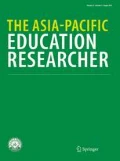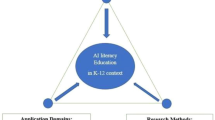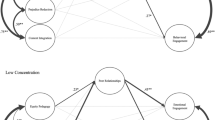Abstract
Using data drawn from the OECD’s Program for International Student Assessment (PISA) conducted in 2009, the present study sought to examine the mediating effects of three kinds of variables in order to account for the relationships between gender and the digital reading performance of students. The three kinds of variables are (1) online reading activities, (2) information and communication technology (ICT) use at school, and (3) ICT use at home, for schoolwork and for leisure. Economic, social, and cultural status and the student’s print reading literacy performance served as control variables in the mediation analyses. Because Korea and Hong Kong were both high-performing economies in PISA 2009, the underlying ICT-related mechanisms unveiled in the mediation analyses can show educational practitioners why, from a comparative education perspective, the digital reading gender gap that favors females is substantially smaller than that seen in print reading. The two key findings are as follows. First, the observed gender difference in digital reading performance favoring females in Hong Kong can be attributed to gender differences in the students’ engagement in online reading activities and their ICT use at home for leisure. Second, the observed gender difference in digital reading literacy performance favoring females in Korea can be attributed to gender difference in the ICT use of students at home for leisure, but not students’ engagement in online reading activities. The present study highlights the importance of guidance and counseling regarding the ICT use of students at home for leisure.

Similar content being viewed by others
References
Aoki, H., Kim, J., & Lee, W. (2013). Propagation & level: Factors influencing in the ICT composite index at the school level. Computers & Education, 60(1), 310–324. doi:10.1016/j.compedu.2012.07.013.
Appel, M. (2012). Are heavy users of computer games and social media more computer literate? Computers & Education, 59, 1339–1349.
Aroian, L. A. (1947). The probability function of the product of two normally distributed variables. The Annals of Mathematical Statistics, 18(2), 265–271.
Baron, R. M., & Kenny, D. A. (1986). The moderator mediator variable distinction in social psychological-research: Conceptual, strategic, and statistical considerations. Journal of Personality and Social Psychology, 51(6), 1173–1182.
Ben-David Kolikant, Y. (2012). Using ICT for school purposes: Is there a student-school disconnect? Computers & Education, 59(3), 907–914. doi:10.1016/j.compedu.2012.04.012.
Calvani, A., Fini, A., Ranieri, M., & Picci, P. (2012). Are young generations in secondary school digitally competent? A study on Italian teenagers. Computers & Education, 58(2), 797–807. doi:10.1016/j.compedu.2011.10.004.
Carlo, G., Raffaelli, M., Laible, D. J., & Meyer, K. A. (1999). Why are girls less physically aggressive than boys? Personality and parenting mediators of physical aggression. Sex Roles, 40(9), 711–729.
Cha, S. E., Jun, S. J., Kwon, D. Y., Kim, H. S., Kim, S. B., Kim, J. M., et al. (2011). Measuring achievement of ICT competency for students in Korea. Computers & Education, 56(4), 990–1002. doi:10.1016/j.compedu.2010.11.003.
Claro, M., Preiss, D. D., San Martín, E., Jara, I., Hinostroza, J. E., Valenzuela, S., et al. (2012). Assessment of 21st century ICT skills in Chile: Test design and results from high school level students. Computers & Education, 59(3), 1042–1053. doi:10.1016/j.compedu.2012.04.004.
Eynon, R., & Malmberg, L. E. (2011). A typology of young people’s Internet use: Implications for education. Computers & Education, 56(3), 585–595. doi:10.1016/j.compedu.2010.09.020.
Gil-Flores, J., Torres-Gordillo, J. J., & Perera-Rodriguez, V. H. (2012). The role of online reader experience in explaining students’ performance in digital reading. Computers & Education, 59(2), 653–660. doi:10.1016/j.compedu.2012.03.014.
Hakkarainen, K., Ilomaki, L., Lipponen, L., Muukkonen, H., Rahikainen, M., Tuominen, T., et al. (2000). Students’ skills and practices of using ICT: Results of a national assessment in Finland. Computers & Education, 34(2), 103–117.
Hohlfeld, T. N., Ritzhaupt, A. D., Barron, A. E., & Kemker, K. (2008). Examining the digital divide in K-12 public schools: Four-year trends for supporting ICT literacy in Florida. Computers & Education, 51(4), 1648–1663. doi:10.1016/j.compedu.2008.04.002.
Huang, C. Y., Shen, Y. C., Chiang, I. P., & Lin, C. S. (2007). Characterizing web users’ online information behavior. Journal of the American Society for Information Science and Technology, 58(13), 1988–1997. doi:10.1002/Asi.20669.
Karim, N. S. A., & Hasan, A. (2007). Reading habits and attitude in the digital age: Analysis of gender and academic program differences in Malaysia. Electronic Library, 25(3), 285–298. doi:10.1108/02640470710754805.
Katyal, K. (2010). Educating teachers in Hong Kong for leadership in the age of the internet: A re-conceptualisation. Asia-Pacific Journal of Teacher Education, 38(4), 273–284. Pii 928724349.
Law, N., Lee, M. W., & Chan, A. (2010). Policy impacts on pedagogical practice and ICT use: An exploration of the results from SITES 2006. Journal of Computer Assisted Learning, 26(6), 465–477. doi:10.1111/j.1365-2729.2010.00378.x.
Lee, K. T. (2006). Creating ICT-enriched learner-centred environments: Myths, gaps and challenges. In D. Hung & M. S. Khine (Eds.), Engaged learning with emerging technologies (pp. 203–223). Berlin: Springer. doi:10.1007/1-4020-3669-8_10.
Lee, Y. H., & Wu, J. Y. (2012). The effect of individual differences in the inner and outer states of ICT on engagement in online reading activities and PISA 2009 reading literacy: Exploring the relationship between the old and new reading literacy. Learning and Individual Differences, 22(3), 336–342.
Li, Y., & Ranieri, M. (2010). Are ‘digital natives’ really digitally competent?—A study on Chinese teenagers. British Journal of Educational Technology, 41(6), 1029–1042.
Liu, Z., & Huang, X. (2008). Gender differences in the online reading environment. Journal of Documentation, 64(4), 616–626.
Livingstone, S. (2007). Strategies of parental regulation in the media-rich home. Computers in Human Behavior, 23(2), 920–941.
MacKinnon, D. P., & Fritz, M. S. (2007). Distribution of the product confidence limits for the indirect effect: Program PRODCLIN. Behavior Research Methods, 39(3), 384–389.
Mendelovits, J., Ramalingam, D., & Lumley, T. (2012). Print and digital reading in PISA 2009: Comparison and contrast. Retrieved January 18, 2013, from http://research.acer.edu.au/pisa/6/.
OECD. (2011). PISA 2009 results: Students on line: Digital technologies and performance (Vol. VI). Paris: OECD Publishing.
OECD. (2012). PISA in focus 12: Are boys and girls ready for the digital age? Retrieved January 18, 2013, from http://www.oecd.org/pisa/pisainfocus/.
Spada, M. M., Langston, B., Nikcevic, A. V., & Moneta, G. B. (2008). The role of metacognitions in problematic Internet use. Computers in Human Behavior, 24(5), 2325–2335. doi:10.1016/j.chb.2007.12.002.
Volman, M., van Eck, E., Heemskerk, I., & Kuiper, E. (2005). New technologies, new differences. Gender and ethnic differences in pupils’ use of ICT in primary and secondary education. Computers & Education, 45(1), 35–55.
WESTAT. (2007). WesVar 4.3 User’s guide. Rockville: WESTAT.
Wong, Y. C., Law, C. K., Fung, J. Y. C., & Lee, V. W. P. (2010). Digital divide and social inclusion: Policy challenge for social development in Hong Kong and South Korea. Journal of Asian Public Policy, 3(1), 37–52.
Wu, M. D., & Chen, S. C. (2008). Elementary schoolteachers’ use of instructional materials on the web. Electronic Library, 26(6), 833–843. doi:10.1108/02640470810921619.
Yellowlees, P. M., & Marks, S. (2007). Problematic Internet use or Internet addiction? Computers in Human Behavior, 23(3), 1447–1453. doi:10.1016/j.chb.2005.05.004.
Zhang, M. L., & Quintana, C. (2012). Scaffolding strategies for supporting middle school students’ online inquiry processes. Computers & Education, 58(1), 181–196. doi:10.1016/j.compedu.2011.07.016.
Author information
Authors and Affiliations
Corresponding author
Rights and permissions
About this article
Cite this article
Cheung, Kc., Mak, Sk. & Sit, Ps. Online Reading Activities and ICT Use as Mediating Variables in Explaining the Gender Difference in Digital Reading Literacy: Comparing Hong Kong and Korea. Asia-Pacific Edu Res 22, 709–720 (2013). https://doi.org/10.1007/s40299-013-0077-x
Published:
Issue Date:
DOI: https://doi.org/10.1007/s40299-013-0077-x




